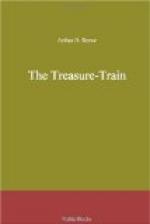We devoured it hastily. In substance it was identical with the first, except that at the end she had added two clauses. In the first she had done just as her mother had directed. Twenty-five thousand dollars had been left to Doctor Aitken. I glanced at Kennedy, but he was reading on, taking the second clause. I read also. Fifty thousand dollars was given to endow the New York Japanese Mission.
Immediately the thought of Kato and what Miss Langdale had just told us flashed through my mind.
A second time we heard the nurse’s footsteps on the hardwood floor of the hall. Craig closed the desk softly.
“Doctor Aitken is ready to go,” she announced. “Is there anything more you wish to ask?”
Kennedy spoke a moment with the doctor as he passed out, but, aside from the information that Mrs. Wardlaw was, in his opinion, growing worse, the conversation added nothing to our meager store of information.
“I suppose you attended Mrs. Marbury?” ventured Kennedy of Miss Langdale, after the doctor had gone.
“Not all the time,” she admitted. “Before I came there was another nurse, a Miss Hackstaff.”
“What was the matter? Wasn’t she competent?”
Miss Langdale avoided the question, as though it were a breach of professional etiquette to cast reflections on another nurse, although whether that was the real reason for her reticence did not appear. Craig seemed to make a mental note of the fact.
“Have you seen anything—er—suspicious about this Kato?” put in Leslie, while Kennedy frowned at the interruption.
Miss Langdale answered quickly, “Nothing.”
“Doctor Aitken has never expressed any suspicion?” pursued Leslie.
“Oh no,” she returned. “I think I would have known it if he had any. No, I’ve never heard him even hint at anything.” It was evident that she wished us to know that she was in the confidence of the doctor.
“I think we’d better be going,” interrupted Kennedy, hastily, not apparently pleased to have Leslie break in in the investigation just at present.
Miss Langdale accompanied us to the door, but before we reached it it was opened from the outside by a man who had once been and yet was handsome, although one could see that he had a certain appearance of having neglected himself.
Leslie nodded and introduced us. It was Doctor Wardlaw.
As I studied his face I could see that, as Leslie had already told us, it plainly bore the stigma of nervousness.
“Has Doctor Aitken been here?” he inquired, quickly, of the nurse. Then, scarcely waiting for her even to nod, he added: “What did he say? Is Mrs. Wardlaw any better?”
Miss Langdale seemed to be endeavoring to make as optimistic a report as the truth permitted, but I fancied Wardlaw read between the lines. As they talked it was evident that there was a sort of restraint between them. I wondered whether Wardlaw might not have some lurking suspicion against Aitken, or some one else. If he had, even in his nervousness he did not betray it.




